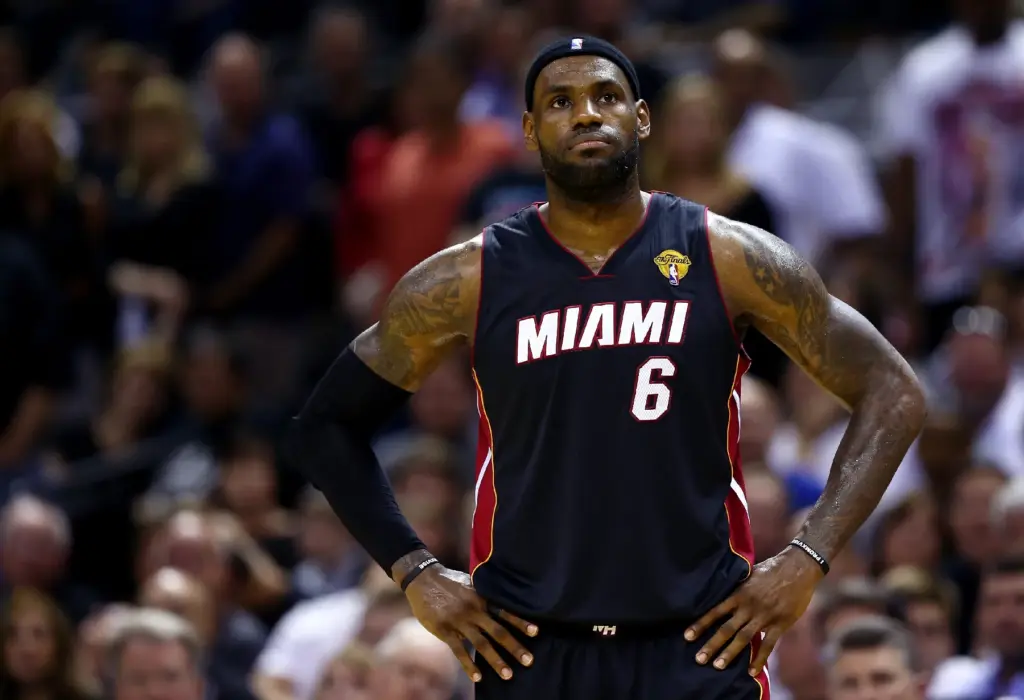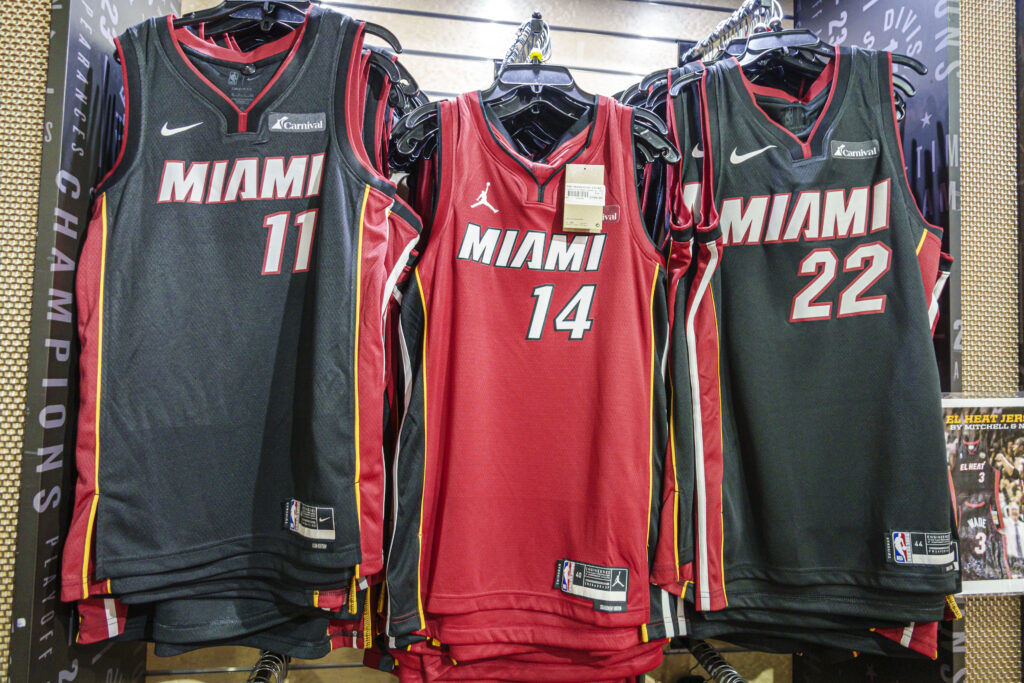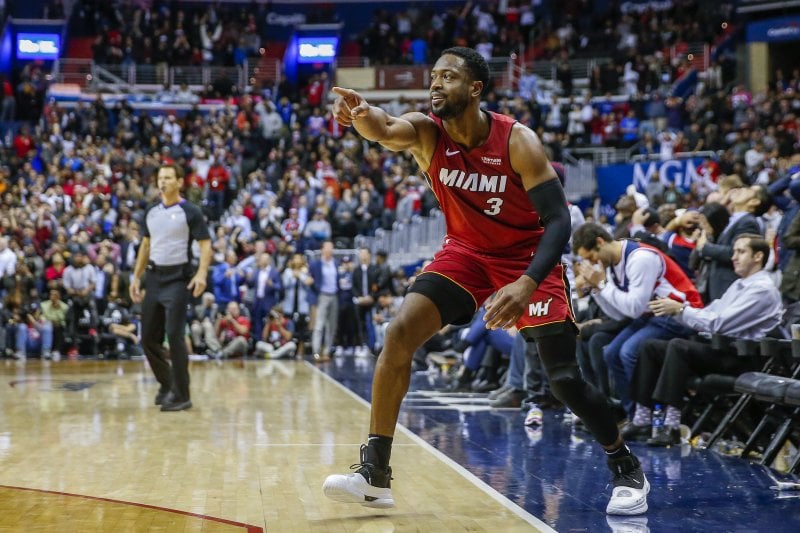The United States Department of Justice announced on August 5, 2025, that a former Miami Heat security officer, Marcos Thomas Perez, has been charged with a felony for allegedly stealing over 400 game-worn jerseys and other valuable memorabilia from the team, valued at millions of dollars. The news, reported by TMZ and other outlets, has shocked the NBA community, as Perez, a 25-year veteran of the Miami Police Department, is accused of exploiting his access to the Kaseya Center to orchestrate what has been described as one of the largest memorabilia heists in sports history. This article explores Perez’s background, the details of the alleged theft, its impact on the Miami Heat, and the broader implications for the organization and the sports memorabilia market.
Marcos Thomas Perez: A Trusted Insider
Marcos Thomas Perez, born in 1963 in Miami, Florida, built a reputation as a dedicated law enforcement officer and security professional before his arrest. A 25-year veteran of the Miami Police Department from 1992 to 2016, Perez earned commendations for his service, including work in community policing and high-pressure assignments. After retiring from the police force, he transitioned to a security role with the Miami Heat from 2016 to 2021, where he was entrusted with game-day security duties at the Kaseya Center (formerly American Airlines Arena). His role granted him access to a secured equipment room containing hundreds of game-worn jerseys and other memorabilia intended for a planned Miami Heat museum.
From 2022 to 2025, Perez continued his career as an NBA security employee, maintaining access to the Kaseya Center and its facilities. His long tenure in law enforcement and security positioned him as a trusted figure, making his alleged actions all the more surprising. Perez’s background as a retired police officer and his deep ties to Miami’s community added a layer of complexity to the case, as authorities and fans grapple with how a respected figure could be implicated in such a significant theft.

The Memorabilia Heist: Details of the Alleged Crime
The allegations against Perez center on a years-long scheme to steal over 400 game-worn jerseys and other memorabilia from the Miami Heat’s secured equipment room at the Kaseya Center. According to the U.S. Attorney’s Office of the Southern District of Florida, Perez exploited his position to access the room, which housed items intended for a future Miami Heat museum. The stolen items included high-value pieces, such as a LeBron James NBA Finals jersey from Game 7 of the 2013 NBA Finals, which Perez allegedly sold for $100,000 to an online broker. That same jersey later fetched $3.7 million at a Sotheby’s auction in 2023, highlighting the immense value of the stolen goods.
Between 2020 and 2023, Perez is accused of selling over 100 stolen items through online marketplaces, generating approximately $2 million in revenue. Prosecutors note that Perez often sold the items at prices well below market value, possibly to avoid detection, which allowed brokers to resell them at significant markups. The scheme came to light after NBA insider Amin Elhassan discussed the theft on “The Dan Le Batard Show” in July 2025, describing it as “one of the largest, if not the largest, memorabilia heists in the history of this country.” On April 3, 2025, law enforcement executed a search warrant at Perez’s Miami residence, recovering nearly 300 additional stolen jerseys and memorabilia, which the Heat confirmed were taken from their facility.
Perez was charged with transporting and transferring stolen goods in interstate commerce, a federal felony, and made his initial appearance in federal court in Miami on August 5, 2025. The FBI and U.S. Attorney’s Office are continuing to investigate, with questions lingering about whether others, potentially including another Miami police officer, were involved in the scheme. The Miami Heat and the Miami Police Department have declined to comment due to the ongoing investigation, and Perez’s attorney has not yet issued a public statement.
A Pattern of Trust and Betrayal
The allegations against Perez represent a significant breach of trust, given his role as a security officer with privileged access. His tenure with the Miami Police Department and subsequent positions with the Miami Heat and NBA placed him in a position of authority, making his alleged actions a stark betrayal of the organizations he served. The Kaseya Center’s equipment room was accessible to only a limited number of trusted individuals, and Perez’s ability to repeatedly access it over nearly a decade (2016–2025) suggests a calculated effort to exploit his role.
While this is the first publicized incident of misconduct tied to Perez, the scale of the theft—over 400 items stolen and $2 million in illicit sales—raises questions about oversight within the Heat’s security protocols. Posts on X from August 5, 2025, reflect fan shock and disappointment, with users like @TMZ_Sports and @Anthony_Chiang emphasizing the unprecedented nature of the heist. The involvement of a former police officer has also sparked speculation on platforms like Reddit about systemic issues in vetting security personnel for high-value assets. The Miami Heat’s silence on the matter, coupled with the ongoing FBI investigation, suggests that further details may emerge about how the theft went undetected for so long.
Impact on the Miami Heat’s Legacy and Operations
The theft of over 400 game-worn jerseys and other memorabilia is a significant blow to the Miami Heat, an organization known for its storied history and championship pedigree. The stolen items, intended for a future team museum, included artifacts from pivotal moments, such as LeBron James’s 2013 NBA Finals jersey, which symbolized the Heat’s back-to-back championships in 2012 and 2013. The loss of these items deprives the franchise of a tangible connection to its legacy, which includes three NBA titles and iconic players like Dwyane Wade, Chris Bosh, and LeBron James.
Operationally, the heist exposes vulnerabilities in the Heat’s security and inventory management. The Kaseya Center’s equipment room was meant to safeguard memorabilia, yet Perez’s alleged actions went unnoticed for years. The organization now faces the challenge of reassessing its protocols to prevent future breaches, particularly as it plans for the museum. The Miami Heat’s decision not to comment, as noted by CNN and other outlets, reflects the sensitivity of the situation, with the team likely conducting an internal review alongside the FBI’s investigation. The recovery of nearly 300 items from Perez’s home offers some relief, but the financial and sentimental value of the remaining items remains uncertain.
The scandal could also affect the Heat’s fanbase and public perception. Posts on X from August 5, 2025, show fans expressing outrage over the theft, with some, like @MailSport, highlighting the cultural significance of the stolen jerseys. The Heat’s 2025–26 season, which includes high-profile matchups against rivals like the Boston Celtics and New York Knicks, may see added scrutiny as the organization navigates the fallout. Coach Erik Spoelstra and team president Pat Riley, known for their emphasis on “Heat Culture,” may need to address the incident to maintain fan trust.
💸 Money Angle / Wealth Perspective
The financial implications of Marcos Perez’s alleged theft are staggering, both for the Miami Heat and Perez himself. The stolen memorabilia, valued at millions of dollars, included over 400 game-worn jerseys, with one LeBron James NBA Finals jersey alone fetching $3.7 million at a Sotheby’s auction after Perez sold it for just $100,000. Over three years (2020–2023), Perez allegedly earned $2 million from selling over 100 items, often at below-market prices to online brokers. This discrepancy—selling high-value items like the James jersey for a fraction of their worth—suggests a focus on quick transactions, possibly to avoid detection, but it also underscores the immense value of the stolen goods.
For Perez, the $2 million in illicit earnings represents a significant personal windfall, but it comes with severe consequences. If convicted of transporting and transferring stolen goods in interstate commerce, he faces potential fines and up to seven years in prison, which could deplete his wealth and tarnish his 25-year police career. The search warrant executed on April 3, 2025, recovered nearly 300 items, potentially reducing his financial liability, but the FBI’s ongoing investigation may uncover additional transactions, increasing his legal and financial exposure.
For the Miami Heat, the financial loss is twofold: the direct value of the stolen memorabilia and the lost opportunity cost of their planned museum. The LeBron James jersey, valued at $3.7 million, highlights the potential revenue from auctions, exhibitions, or ticket sales for a future museum. The theft may also increase insurance and security costs, as the organization invests in safeguarding remaining assets. The Heat’s brand value, tied to its championship legacy, could also take a hit, potentially affecting sponsorship deals or fan merchandise sales.

🌟 Brand, Influence & Culture Impact
The Miami Heat’s brand, synonymous with “Heat Culture”—a term embodying discipline, resilience, and excellence—faces a challenge with this scandal. The theft of over 400 game-worn jerseys, including iconic pieces from the 2012 and 2013 NBA Finals, undermines the organization’s image as a tightly run franchise under Pat Riley and Erik Spoelstra. Fans on X, such as @nypost on August 5, 2025, expressed disbelief that a trusted employee could orchestrate such a heist, with some questioning the Heat’s oversight. The incident risks eroding fan trust, particularly among collectors and memorabilia enthusiasts who value the team’s historical artifacts.
Perez’s personal brand as a retired Miami police veteran and security professional has been severely damaged. Once a respected figure, his alleged actions have drawn condemnation, with Amin Elhassan’s comments on “The Dan Le Batard Show” amplifying the story’s reach. The scandal may also impact the NBA’s security protocols, as the league reviews how an employee with access to sensitive areas operated undetected for nearly a decade. The cultural significance of the stolen items, particularly those tied to LeBron James’s tenure, resonates deeply in Miami, where the 2010–2014 Big Three era remains a defining chapter. By taking steps to recover the items and support the investigation, the Heat can reinforce their commitment to their legacy and fanbase.
📌 The Distinct Athlete Angle
While Marcos Perez is not an athlete, his role as a former security officer for the Miami Heat and NBA places him at the intersection of sports and trust, making his case a unique lens into the sports memorabilia world. Perez’s 25-year career with the Miami Police Department and subsequent roles gave him unparalleled access to the Kaseya Center’s equipment room, home to over 400 game-worn jerseys from players like LeBron James, Dwyane Wade, and Chris Bosh. His alleged theft of these items, intended for a future Heat museum, betrayed the trust of an organization and fanbase that reveres its history.
Perez’s story highlights the unique pressures faced by non-athlete insiders in professional sports. As a security officer, he was entrusted with protecting valuable assets, yet his alleged actions suggest a lapse in judgment driven by the lucrative sports memorabilia market. The recovery of nearly 300 items during the April 3, 2025, search offers a chance for redemption, but Perez’s legacy is now tied to one of the largest memorabilia heists in sports history. His case underscores the importance of ethical conduct in roles adjacent to athletes, where access can lead to significant temptation.
Legal and Organizational Ramifications
Perez faces a federal felony charge of transporting and transferring stolen goods in interstate commerce, which carries a potential penalty of up to seven years in prison and significant fines if convicted. His initial court appearance on August 5, 2025, marks the beginning of a legal process that could extend for months, with the FBI and U.S. Attorney’s Office continuing to investigate potential accomplices. Local 10 News reported ongoing inquiries into whether another Miami police officer was involved, though no additional charges have been filed as of August 2025.
For the Miami Heat, the incident necessitates a review of security protocols and inventory management. The organization’s plan for a team museum may be delayed as it assesses the full extent of the loss and implements safeguards. The NBA, which employed Perez from 2022 to 2025, may also face scrutiny over its vetting and oversight of security personnel. The Miami Police Department, while not directly implicated, has confirmed Perez’s tenure from 1992 to 2016, distancing itself from his post-retirement actions.
Broader Implications: Lessons and Accountability
The Marcos Perez case serves as a cautionary tale about trust and accountability in professional sports. The theft of over 400 game-worn jerseys, including a $3.7 million LeBron James jersey, highlights the high value of sports memorabilia and the vulnerabilities in safeguarding it. For the Miami Heat, the incident is a setback but also an opportunity to strengthen their operations and reaffirm their commitment to preserving their legacy. The organization’s cooperation with the FBI and recovery of nearly 300 items demonstrates proactive steps toward accountability.
For the sports memorabilia industry, the case underscores the need for provenance and authentication to prevent stolen goods from entering the market. The Sotheby’s auction of the LeBron James jersey for $3.7 million shows how stolen items can inflate prices, affecting collectors and auction houses. The NBA and other leagues may respond by tightening security for game-worn items, which are increasingly valuable in the era of fan engagement and collectible culture.
Perez’s alleged actions also raise questions about the ethics of insider access. His 25-year police career and subsequent roles gave him credibility, yet his alleged exploitation of that trust has damaged his reputation and sparked debate about vetting processes. Fans on X, such as @CBSMiami, expressed outrage, emphasizing the cultural loss of items meant for a Heat museum. Perez’s path forward depends on the legal outcome, but his case serves as a reminder of the consequences of breaching trust in a high-profile industry.

Conclusion
The felony charge against Marcos Thomas Perez for stealing over 400 game-worn jerseys and $2 million worth of memorabilia from the Miami Heat is a stunning betrayal of trust that has reverberated across the NBA and its fanbase. The Kaseya Center heist, which included a LeBron James NBA Finals jersey sold for $100,000 and later auctioned for $3.7 million, underscores the immense value of sports memorabilia and the vulnerabilities in protecting it. For the Miami Heat, the incident is a blow to their legacy, but the recovery of nearly 300 items and cooperation with the FBI offer a path toward restoration.
As Perez faces federal charges and a potential seven-year prison sentence, the case highlights the importance of accountability and oversight in sports organizations. The Miami Heat must now rebuild trust with fans and strengthen their security to protect their storied history. For the sports memorabilia market, the scandal emphasizes the need for authentication and transparency to prevent stolen goods from tainting the industry. As the 2025–26 NBA season approaches, the Heat and their fans will look to move forward, preserving the legacy of icons like LeBron James and Dwyane Wade while learning from this unprecedented heist.
Related Reads on Distinct Athlete

